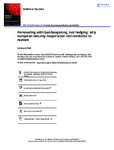Persevering with bandwagoning, not hedging: why European security cooperation still conforms to realism
| dc.contributor.author | Cladi, L | |
| dc.date.accessioned | 2022-10-31T12:10:47Z | |
| dc.date.available | 2022-10-31T12:10:47Z | |
| dc.date.issued | 2022-09-25 | |
| dc.identifier.issn | 1743-9698 | |
| dc.identifier.issn | 1743-9698 | |
| dc.identifier.uri | http://hdl.handle.net/10026.1/19787 | |
| dc.description.abstract |
Over the past few years, European security cooperation has been revived. The EU has launched several defence initiatives and some member states, such as France have launched their own collaborative initiatives. The renewed activism in European security cooperation followed several years of inactivity and warrants theoretical investigation. Hedging is a concept that has been employed to make sense of renewed activism in European security cooperation. By pursuing hedging, Europeans are preparing for a future in which the US might be unwilling or unable to get involved, and to assist with, European security affairs. Advancing a neorealist analysis, this article argues that European states’ efforts to increase cooperation remain consistent with the broader trajectory of European security cooperation since the end of the Cold War. European states remain dependent on the US for their security and are still far from autonomously projecting their influence internationally. This article illustrates the argument with reference to the recent withdrawal of the US from Afghanistan and the French promise to wind down its commitment in the Sahel. The implications of this argument are discussed in detail. | |
| dc.format.extent | 624-643 | |
| dc.language | en | |
| dc.language.iso | en | |
| dc.publisher | Taylor and Francis Group | |
| dc.subject | 4408 Political Science | |
| dc.subject | 44 Human Society | |
| dc.title | Persevering with bandwagoning, not hedging: why European security cooperation still conforms to realism | |
| dc.type | journal-article | |
| dc.type | Journal Article | |
| plymouth.issue | 4 | |
| plymouth.volume | 22 | |
| plymouth.publication-status | Published | |
| plymouth.journal | Defence Studies | |
| dc.identifier.doi | 10.1080/14702436.2022.2110476 | |
| plymouth.organisational-group | /Plymouth | |
| plymouth.organisational-group | /Plymouth/Faculty of Arts, Humanities and Business | |
| plymouth.organisational-group | /Plymouth/Faculty of Arts, Humanities and Business/School of Society and Culture | |
| plymouth.organisational-group | /Plymouth/REF 2021 Researchers by UoA | |
| plymouth.organisational-group | /Plymouth/REF 2021 Researchers by UoA/UoA20 Social Work and Social Policy | |
| plymouth.organisational-group | /Plymouth/Users by role | |
| plymouth.organisational-group | /Plymouth/Users by role/Academics | |
| dcterms.dateAccepted | 2022-08-03 | |
| dc.rights.embargodate | 2022-11-1 | |
| dc.identifier.eissn | 1743-9698 | |
| dc.rights.embargoperiod | Not known | |
| rioxxterms.versionofrecord | 10.1080/14702436.2022.2110476 | |
| rioxxterms.licenseref.uri | http://www.rioxx.net/licenses/all-rights-reserved | |
| rioxxterms.type | Journal Article/Review |


